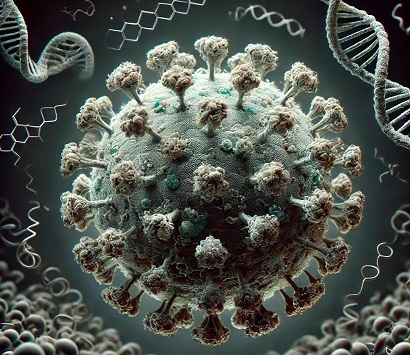U.S. NIAID study uncovers AP3B1's role as a barrier to SARS-CoV-2 replication
Nikhil Prasad Fact checked by:Thailand Medical News Team Aug 30, 2024 6 months, 3 days, 14 hours, 6 minutes ago
A groundbreaking study conducted by researchers at the U.S. National Institute of Allergy and Infectious Diseases (NIAID) has shed new light on how the human body naturally defends itself against the SARS-CoV-2 virus, which causes COVID-19. This
Medical News report discusses the pivotal role of the human host protein AP3B1 in inhibiting the replication of the virus, offering promising insights for future therapeutic developments.
 U.S. NIAID study uncovers AP3B1's role as a barrier to SARS-CoV-2 replication
Understanding AP3B1 and Its Importance
U.S. NIAID study uncovers AP3B1's role as a barrier to SARS-CoV-2 replication
Understanding AP3B1 and Its Importance
AP3B1, a subunit of the adaptor protein complex 3 (AP-3), is essential for intracellular trafficking, helping to move proteins and other molecules to specific compartments within cells. This function is crucial for maintaining cellular health and supporting immune responses. The AP-3 complex, particularly the AP3B1 subunit, plays a significant role in the formation of lysosome-related organelles (LROs), which are specialized compartments within cells that handle various important tasks, including immune responses.
During the COVID-19 pandemic, many studies have focused on understanding how SARS-CoV-2 interacts with human cells. One such study identified a potential interaction between the viral envelope (E) protein of SARS-CoV-2 and the AP3B1 protein. This interaction was initially flagged by several proteomic studies, but until recently, the exact impact of this interaction on viral replication had not been fully explored.
Key Findings of the Study
The U.S. NIAID study focused on verifying the interaction between AP3B1 and the SARS-CoV-2 E protein and understanding its implications for the virus's life cycle. The researchers used a series of experiments involving human cells that had been infected with the SARS-CoV-2 virus. They employed techniques such as immunoprecipitation and immunofluorescence assays to confirm the interaction between AP3B1 and the E protein.
The results were striking. The overexpression of AP3B1 in the infected cells led to a significant reduction in the replication of the SARS-CoV-2 virus. In contrast, when AP3B1 was depleted using small interfering RNA (siRNA), there was an increase in the release of infectious viral particles. This finding strongly suggests that AP3B1 acts as an intrinsic barrier to the replication of SARS-CoV-2, making it a critical component of the body's natural defense against the virus.
How AP3B1 Interferes with SARS-CoV-2 Replication
The study further delved into the mechanisms by which AP3B1 inhibits SARS-CoV-2 replication. The AP3B1 protein is involved in the trafficking of proteins within cells, particularly those destined for lysosomes and other LROs. Lysosomes play a crucial role in breaking down and recycling cellular waste, but they are also involved in the immune response by degrading pathogens.
The SARS-CoV-2 virus relies on manipulating the host cell's machinery to replicate and spread. The viral E protein, which is a minor component of the virus's structure, interacts with various host proteins to facilit
ate the virus's life cycle. One of these interactions involves the AP3B1 protein. The study found that when AP3B1 is present in higher quantities, it can interfere with the viral E protein's function, thereby reducing the virus's ability to replicate.
Implications for Future Research and Therapeutics
This discovery opens up new avenues for research into potential treatments for COVID-19. By understanding how AP3B1 and similar proteins act as barriers to viral replication, scientists can explore ways to enhance these natural defenses in patients. One possibility is the development of drugs that can boost the expression or activity of AP3B1, thereby providing a new form of antiviral therapy that works by strengthening the body's intrinsic defense mechanisms.
The findings also have broader implications for understanding how other viruses interact with host cells. For example, the AP-3 complex, to which AP3B1 belongs, has been shown to play roles in the replication of other viruses, such as HIV-1 and certain paramyxoviruses. This suggests that AP3B1 could be part of a more general antiviral defense mechanism that could be leveraged against a variety of viral infections.
Conclusion
In conclusion, the NIAID study has identified AP3B1 as a critical player in the body's defense against SARS-CoV-2, revealing its role as an intrinsic barrier to viral replication. This discovery not only enhances our understanding of the complex interactions between viruses and host cells but also points to new potential therapeutic strategies for combating COVID-19 and possibly other viral diseases.
The study findings were published in the peer-reviewed journal: Viruses.
https://www.mdpi.com/1999-4915/16/9/1377
For the latest COVID-19 News, keep on logging to Thailand
Medical News.
Read Also:
https://www.thailandmedical.news/news/japanese-study-reveals-that-omicron-variants-prefer-endosomal-cathepsin-l-for-viral-entry-over-tmprss2
https://www.thailandmedical.news/news/cd55-protein-s-role-in-covid-19-lung-damage-and-ards-a-potential-therapeutic-target
